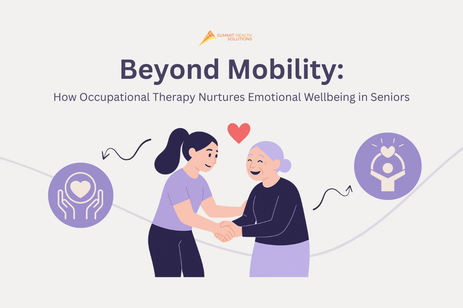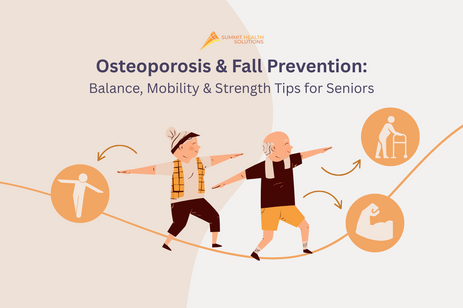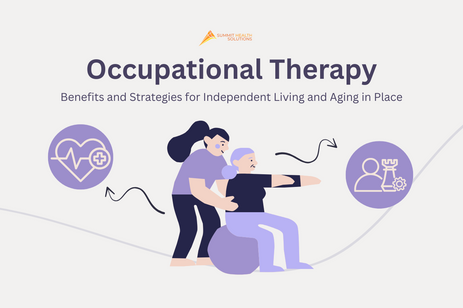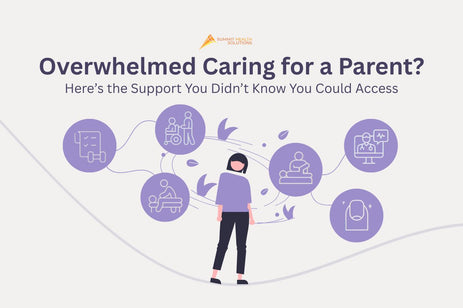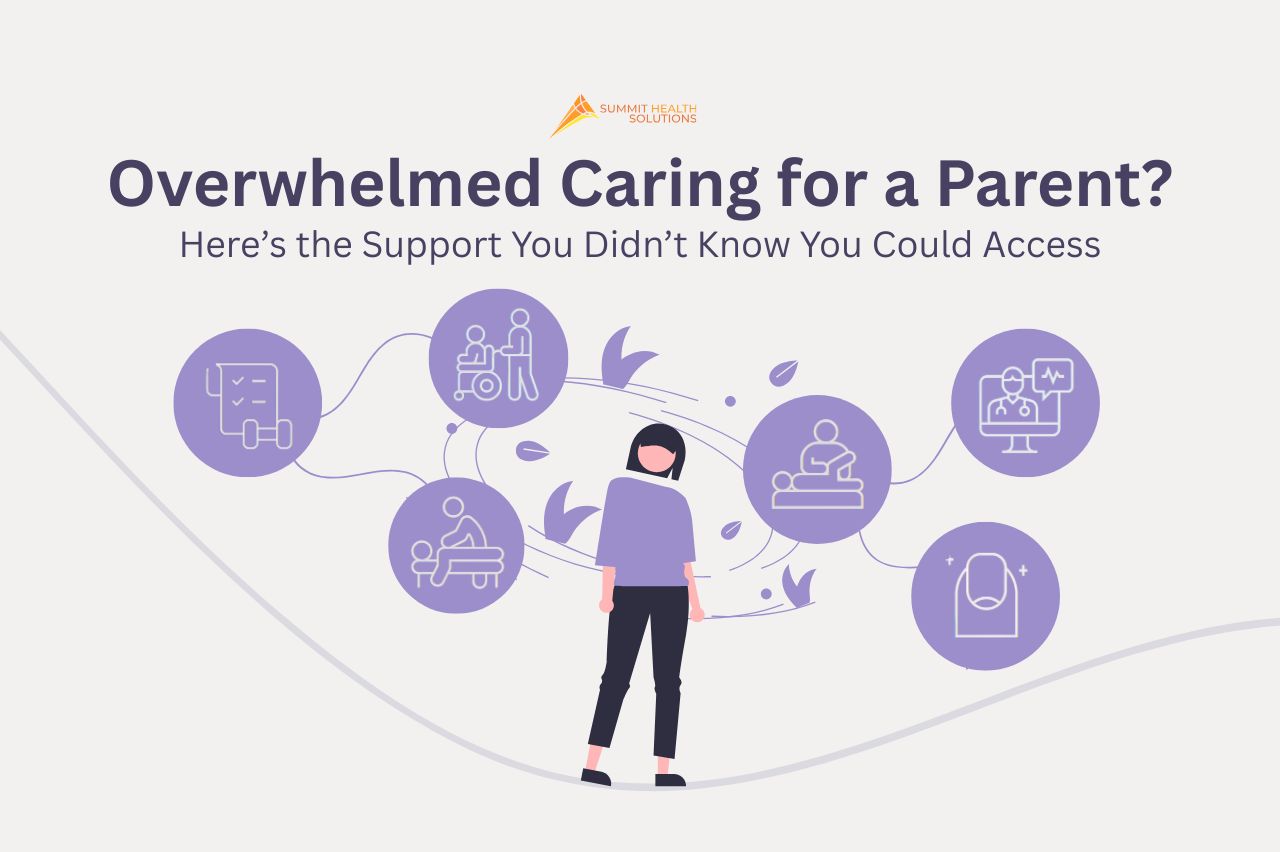
Tuesday afternoon, and your phone buzzes with yet another call from your 76-year-old mum. She's fallen again, this time in the kitchen. You're stuck in a meeting, your mind racing between work deadlines and the growing fear that she's no longer safe alone at home.
Sound familiar? You're not alone in this struggle.
Caring for a parent while juggling your own life creates overwhelming stress that affects your health, relationships, and career. But here's what most Australian families don't realise – there's a whole network of professional support designed specifically for situations like yours.
The Hidden Crisis of Family Caregiving
Over 2.7 million Australians currently provide unpaid care for aging family members, according to the Australian Bureau of Statistics. Most started gradually – a weekly grocery shop here, a doctor's appointment there – until suddenly they're managing medications, coordinating appointments, and losing sleep over safety concerns.
The warning signs that caregiving is becoming overwhelming:
-
Constant worry about your parent's safety
-
Feeling guilty when you're not available to help
-
Your own health declining from stress
-
Work performance suffering due to caregiving duties
-
Family relationships strained by competing demands
-
Feeling isolated and unsure where to turn for help
The breaking point often comes after a fall, medical emergency, or when you realise your parent's needs have outgrown what you can safely manage alone.
Why Going It Alone Isn't Working
Many adult children believe they should handle everything themselves. This mindset comes from love, but it's creating dangerous situations for everyone involved.
The reality of DIY caregiving:
Your parent may not receive the specialised care they need for specific conditions. You're constantly stressed, which affects your ability to make good decisions. Important health issues get missed because you're not trained to spot them.
Family dynamics become strained when one person carries the entire caregiving load.
Professional intervention often happens only after a crisis, when prevention could have avoided the emergency altogether.
The Support System That Changes Everything
Australia's aged care system includes allied health services specifically designed to support families like yours. These aren't just medical treatments – they're comprehensive support systems that address the root causes of your caregiving stress.
Allied health professionals work differently from traditional healthcare. Instead of waiting for problems to develop, they focus on maintaining independence and preventing the situations that create family emergencies.
Occupational Therapy: Making Home Life Safer and Easier
Occupational therapists specialise in helping seniors navigate daily activities safely. They assess your parent's home environment and identify potential hazards before accidents happen.
How occupational therapy reduces family stress:
-
Home safety assessments that prevent falls
-
Equipment recommendations for safer bathing and mobility
-
Strategies for managing medications independently
-
Cognitive assessments to identify early signs of decline
-
Family education on supporting independence without taking over
Lisa from Melbourne describes the transformation: "The occupational therapist showed Mum how to use simple tools that made cooking safe again. I went from daily panic calls to weekly check-ins."
This isn't about taking away independence – it's about preserving it through smart modifications and professional guidance.
Learn More About Occupational Therapy Here
Physiotherapy: Addressing the Root Cause of Mobility Issues
Many family emergencies stem from declining physical strength and balance. Physiotherapy addresses these issues proactively rather than reactively.
Physiotherapy support includes:
-
Fall prevention exercises tailored to your parent's specific needs
-
Pain management techniques that reduce reliance on medications
-
Mobility assessments to identify problems before they become dangerous
-
Home exercise programs that family members can help supervise
-
Recovery support after injuries or medical procedures
The goal is keeping your parent strong and mobile enough to maintain independence, reducing the crisis calls that disrupt your daily life.
Learn More About Physiotherapy Here
The Allied Health Advantage You're Missing
Allied health services offer something traditional healthcare often can't – time and specialisation. These professionals spend extended periods with your parent, developing comprehensive understanding of their specific needs and challenges.
What makes allied health different:
Preventive focus: Problems are addressed before they become emergencies.
Home-based care: Services provided in your parent's familiar environment.
Family involvement: You're included in care planning and decision-making.
Coordinated approach: Different specialists work together rather than in isolation.
Ongoing monitoring: Regular check-ins prevent issues from escalating.
Browse Our Allied Health Services Here
Breaking Through the Barriers
Many families avoid seeking professional help due to common misconceptions.
"We can't afford private services" Medicare and private health insurance often cover allied health services. Many providers also offer bulk billing options or payment plans.
"Mum won't accept outside help" Allied health professionals are trained to work with reluctant clients. They focus on maintaining independence rather than taking control.
"It's too complicated to organise" Professional care coordinators handle the logistics, scheduling, and communication between different services.
"We don't qualify for government support" Allied health services are available regardless of income level or government package status.
The Ripple Effect of Professional Support
When you bring in allied health professionals, the benefits extend far beyond your parent's immediate needs.
For your parent:
-
Maintained independence and dignity
-
Improved physical and mental health
-
Social connection through regular professional visits
-
Confidence in their ability to stay at home safely
For your family:
-
Reduced stress and anxiety about safety
-
Better work-life balance
-
Improved relationships when caregiving pressure decreases
-
Peace of mind knowing professional eyes are monitoring the situation
For you personally:
-
Time to focus on being a son or daughter, not just a caregiver
-
Better sleep knowing professionals are managing health concerns
-
Reduced guilt about not being available 24/7
-
Support network of professionals who understand your challenges
Taking the First Step Without Overwhelming Your Parent
The key to successful professional support is gradual introduction. Start with one service that addresses your biggest concern – often physiotherapy for mobility issues or occupational therapy for home safety.
The gentle introduction approach:
Frame it as temporary support after a recent concern or health issue. Involve your parent in choosing which professional to meet first. Start with assessments rather than ongoing treatment to reduce resistance.
Let the professional build the relationship – they're skilled at gaining trust.
Most seniors find they actually enjoy the regular social interaction and professional attention once they overcome initial hesitation.
Your Support Network is One Call Away
You don't have to navigate this alone anymore. Professional allied health support is designed specifically for families facing the challenges you're experiencing right now.
The sooner you reach out, the more options you'll have. Waiting until after a crisis limits your choices and increases stress for everyone involved.
The support you need exists – it's just a matter of knowing how to access it and taking that first step.
Ready to Reduce Your Caregiving Stress?
Stop carrying the entire burden of your parent's care alone. Professional allied health support can transform your family's situation from crisis management to confident, coordinated care.
Take the first step toward peace of mind today.
Contact Summit Health Solutions Australia – we specialise in comprehensive allied health services designed specifically for Australian seniors and their families. Our team includes occupational therapists, physiotherapists, and other allied health professionals who understand exactly what you're going through.
Call 1300 315 315 to speak with our Care team about:
-
Which services would best support your parent's specific needs
-
How to introduce professional support without resistance
-
Medicare and insurance coverage options
-
Coordinating multiple services for comprehensive care
You can also send us a message through the short form here.
Learn more about our services and discover how allied health support can transform your family's caregiving experience.
Don't wait for the next crisis. Professional support is available now, and your family deserves the peace of mind that comes with knowing your parent is receiving expert care.
Download our FREE Senior Exercise Guide to get started with safe, professional-grade exercises that support your parent's independence at home.
DOWNLOAD YOUR FREE SENIOR EXERCISE GUIDE HERE
FAQ
Q: How do I know if my parent needs allied health services?
A: Key indicators include frequent falls or near-falls, difficulty with daily activities, declining mobility, medication management issues, or your own increasing stress about their safety.
Q: How do I convince my resistant parent to accept professional help?
A: Start with a single service framed as temporary support. Focus on maintaining independence rather than receiving "care." Let professionals build the relationship gradually.
Q: What's the difference between allied health and regular medical care?
A: Allied health professionals focus on functional improvement and prevention, spending more time on personalised care plans and family education compared to traditional medical appointments.
Q: Can allied health services be provided at home?
A: Yes, most allied health services can be delivered in your parent's home, which is often more comfortable and effective than clinic-based appointments.
Q: How quickly can services start once we decide to proceed?
A: Initial assessments can often be arranged within days to weeks, depending on the service and location. Emergency situations may receive priority scheduling.

